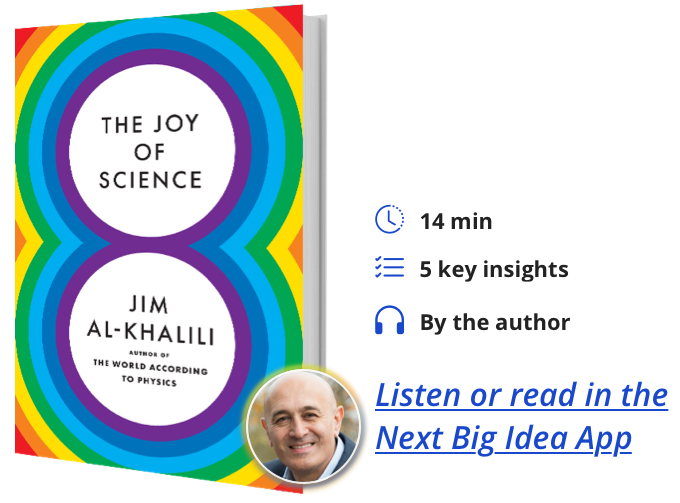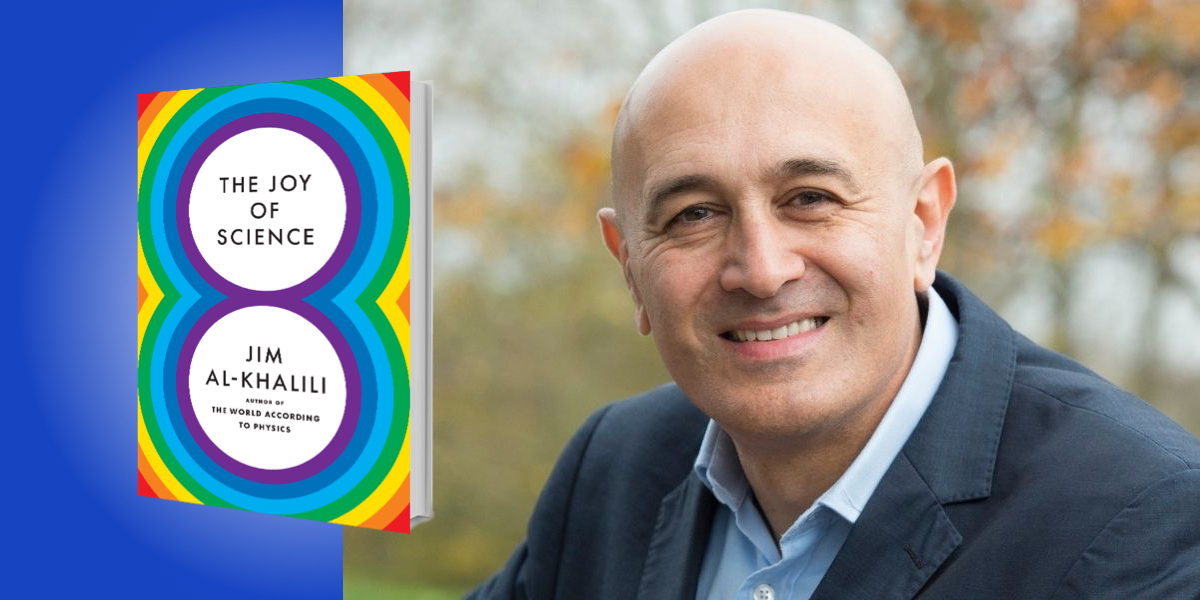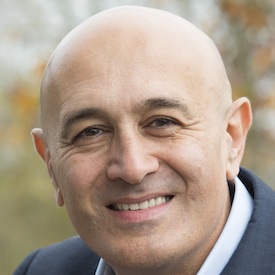Jim Al-Khalili is Distinguished Professor of Theoretical Physics at the University of Surrey and one of Britain’s best-known science communicators. He has written numerous books, including The World According to Physics; Quantum: A Guide for the Perplexed; and Life on the Edge: The Coming of Age of Quantum Biology.
Below, Jim shares 5 key insights from his new book, The Joy of Science. Listen to the audio version—read by Jim himself—in the Next Big Idea App.

1. In science, it’s okay to change your mind.
It’s okay to admit your mistakes. In fact, if we didn’t admit our mistakes, if we never changed our minds, then we would never progress in science. We’d all still be thinking the way the ancient Greeks thought—that there are four elements: earth, air, water, and fire. As we learn, gain more information, gather more data, make more observations, carry out experimentations, and develop theories and hypotheses, our understanding grows. And inevitably, this means that what we thought before wasn’t right, and we have to revise our views. So admitting mistakes isn’t a weakness in science—actually, it’s a strength.
Unfortunately, if you think about politics, the opposite is true. Politicians hate admitting mistakes, or showing that they’ve changed their minds. I propose that the world would be a much better place if more people were prepared to accept that they may be wrong about something and change their minds. We should always have uncertainty and open minds. In science, the notion of uncertainty is very important. It doesn’t mean we don’t know; it means we know what we don’t know. Voltaire once said, “Doubt is not a pleasant condition, but certainty is absurd.”
2. Examine your own biases before challenging those of others.
We are constantly bombarded by information. Indeed, life used to be simpler before the internet. I’m not suggesting the internet is a bad thing—it’s wonderful! It has transformed society. But in the past, we’d read one newspaper, we would probably watch one cable TV channel, we’d form our opinions in that way, and we’d surround ourselves with people and ideas that we already agreed with.
Now, with the internet, every opinion is coming at us from every direction. And rather than becoming more enlightened and well-rounded as a society, we’re becoming more polarized. We are digging in our heels, building defenses, unwilling to see the other person’s point of view.
“Doubt is not a pleasant condition, but certainty is absurd.”
The polarization of opinions doesn’t work in science. Yes, there are scientists who stick dogmatically to whatever theory they have, or whatever experimental result they have built their scientific reputation on—but broadly, the scientific method corrects for that.
When a scientist normally presents an idea or makes a discovery or comes up with a new theory, they examine it very carefully. They test it to destruction—they try to figure out, “Well, what if I’m wrong? What if this isn’t correct? How can I test it? How can I be confident that what I’m saying is something correct and real about the world?” Because of course, if you publish your results in a scientific journal and it turns out that they’re wrong, well, that’s it—you have to change your mind. So rather you find your mistakes than other people point them out to you.
Why don’t we do this in everyday life? When you’re arguing on social media, why not think about why you believe what you believe before digging in your heels and accusing others of always being wrong?
3. Things aren’t always as simple as we’d like them to be.
I’m sure you’ve heard of Occam’s razor, the idea that the simplest solution, the simplest explanation, is usually the correct one. This has been very useful in science over the years, but unfortunately, it has infected wider thinking in society. It has evolved into meaning, “I only want the simplest explanation; I’m not prepared to dig deeper into something. Don’t blind me with details.”
In today’s society, particularly on social media, everything is condensed down to a meme or a tweet. And that means that all nuance in debate, whether it’s about politics or religion or wider moral and ethical issues, simply become black-or-white—the gray in between is lost.
Those who know a lot more than average about a particular complex issue facing society tend to also know the gaps in their knowledge. But they’re not prepared to say that there’s some truth on both sides of the argument—that you have a point, and that the other side also has a point. In today’s society, if you take that view, both sides will attack you. They will say, “You’re either with me or you’re against me.”
“In today’s society, particularly on social media, everything is condensed down to a meme or a tweet.”
Unfortunately, in the real world—as in many areas of science—things are more complicated than we would wish them to be. So we should acknowledge that. Sometimes you’ve got to do a bit of digging, and maybe find out there’s a bit of nuance behind it, and allow yourself to be open to expanding your view on a particular subject.
4. It’s okay to disagree, and we should do it without being disagreeable.
Scientists argue—they have vested interests and biases. If you’ve built your reputation on a particular theory or experimental result, or you’ve published a particular paper that others say is wrong, you’re going to disagree with them. You’re going to stand up and fight for your cause, for what you believe in. We debate and discuss, but this is how we make progress. This links back to one of my earlier points about how it’s okay to admit your mistakes. We can disagree, and we do all the time—but it’s good-natured, or at least it should be.
And it shouldn’t be based on passionate, ideological belief. But science is not value-free all the time, and what I’m talking about is more easily applied in physics, chemistry, biology, astronomy, and geology than it is, say, in the social sciences. Nevertheless, we should be able to disagree without worrying about scoring points. It’s not about winning arguments; it’s about trying to reach the truth of the matter.
5. A scientific understanding of the world is not only empowering, but can also enrich our lives.
Having a more scientifically literate society is important. We’ve understood this over the course of the pandemic—we need to understand the pros and cons of wearing a mask, how viruses are spread, and the importance of getting vaccinated. But even more broadly than that, we need to know the benefits of flossing our teeth or recycling our rubbish. So being more scientifically literate is empowering, particularly as we face the challenges of the 21st century.
“A scientific understanding of the world is personally enriching—it adds to the wonder of the world.”
Additionally, having a scientific understanding of the world is personally enriching—it adds to the wonder of the world. Isaac Newton, the great physicist who discovered that sunlight can be broken up into the colors of the rainbow, was accused by the poet John Keats, who said, “You’ve destroyed the magic of the rainbow by breaking it up into its prismatic colors.” Many scientists have given an impassioned argument against this view, that understanding more about the rainbow can make it more beautiful. It doesn’t detract from the mystery, as the great Richard Feynman once said.
For example, if you look up at a rainbow in the sky and wonder at its beauty, science can help add to that. What if I told you that no two people, even standing next to each other, see the same rainbow? We all see our own, separate rainbow. Now that might sound crazy, but think about this: rainbows are formed by sunlight being reflected back from billions of droplets of water from rain falling in the sky. Each spherical droplet of water takes that sunlight, breaks it up into its colors as it enters the water, bounces it off the back of that droplet, and then it comes back and exits the front again from a different place—and the different colors spread out, broken up, and separated further. This is because each color has a different wavelength, and each wavelength of light bends a different amount.
A particular droplet may send red light directly to my eyes, so I see red from that droplet—and of course, from many others. But someone standing next to me will not see red light coming from that droplet, because the light would have to move at a different angle. They would see their red light from different droplets. So we each see a rainbow coming at us from different droplets in the sky. We each see our own, unique rainbow.
And the other thing about rainbows is that we talk about them as being an arc in the sky. But a rainbow is actually a full circle; it’s only broken into an arc because the ground cuts it off. Were you to climb up a mountain, or look when you are on board an aircraft—pilots see this under certain conditions—you’ll see that a rainbow is, in fact, a complete circle.
Isn’t that lovely? That doesn’t make the rainbow boring. We haven’t made it sanitized and logical and rational, and in so doing lost the beauty. We’ve added to the beauty by knowing a bit more about how the world works.
To listen to the audio version read by author Jim Al-Khalili, download the Next Big Idea App today:
































